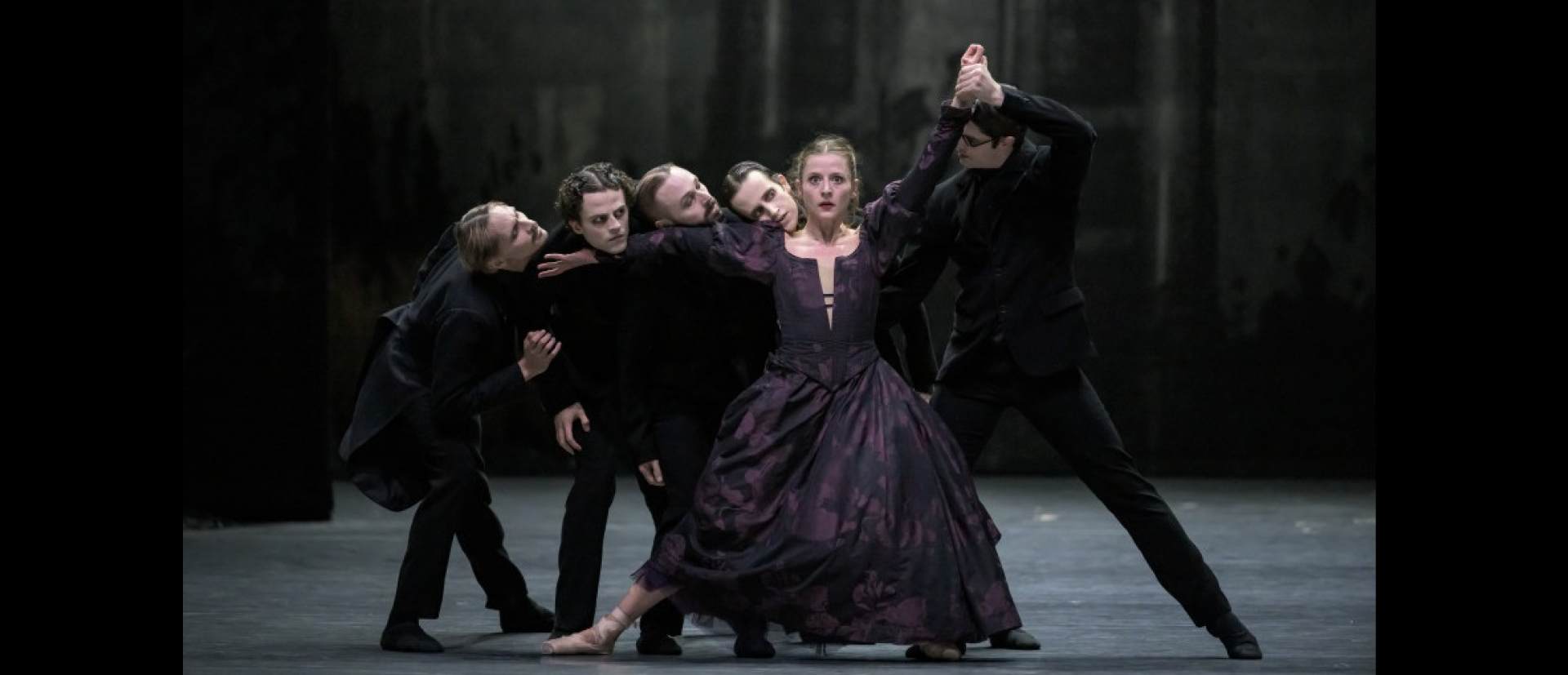Bovary
Mo | Tu | We | Th | Fr | Sa | Su |
Bovary (Ballet)
Duration: 2 hours 20 minutes
Gustave Flaubert’s novel Madame Bovary is a masterpiece of world literature that paved the way for modernism. When it was published in 1856, a scandal ensued. Flaubert was accused of «glorifying adultery and charged with violating public and religious morality and decency». The novel tells the story of a young country woman who wants much more than a suffocating provincial life at the side of her petit-bourgeois, unambitious husband. Emma Bovary rebels against her marriage, takes on lovers, loses herself in dreams of passion, luxury and debauchery – and it ends in disaster. She falls hopelessly into debt, ruins her family and finally takes a fatal dose of poison. ‹Bovarism›, a condition in which a person denies reality, is named after the protagonist of Flaubert’s famous novel: Emma Bovary escapes from her dull life in the provinces through excessive fantasies, which she cultivates by reading romantic novels and Parisian fashion magazines. Her extramarital affairs mirror this kitsch, fantasy world, as she lives beyond her means and loses sight of reality. Measured against its literary fame, Madame Bovary is rarely performed on stage, particularly as a ballet. Flaubert’s narrative style seems too cool and realistic for a stage adaptation. But precisely his detached, accurate language, combined with his total engagement with his subject matter, makes it so inspiring. The female figure as an outsider is at the centre of this new production, which does not tell Madame Bovary as a conventional story ballet but instead breaks up narrative structures and approaches the material through abstract choreography and intimate psychological observation. At the same time, it never loses sight of the tale. Christian Spuck’s dance piece Bovary is about the search for female self-determination, rapture and loneliness, substitutions for love, self-injury, hedonism and the fatal outcome when fantasy worlds and reality merge into one. The concept for this new production by the Staatsballett Berlin is to adapt the literary material using darkly poetic imagery and refined humour – to tell the story, not for the sake of telling it, but to enter the characters’ inner worlds and transform them into dance.
Program and cast
Choreography and Direction: Christian Spuck
Set Design: Rufus Didwiszus
Costumes: Emma Ryott
Lighting: Martin Gebhardt
Dramaturgy and Libretto: Claus Spahn
Video: Tieni Burkhalter
Voice: Marina Frenk
Musical Direction: Jonathan Stockhammer
Piano: Adrian Oetiker
Orchestra of the Deutsche Oper Berlin
Emma Bovary: Polina Semionova
Charles Bovary: Matthew Knight
Léon, Lover: Cohen Aitchison-Dugas
Rodolphe, Lover: Martin ten Kortenaar
Félicité, Emma's Maid: Vivian Assal Koohnavard
Monsieur Lheureux, Merchant: Dominik White Slavkovský
Monsieur Homais, Apothecary: Erick Swolkin
Monsieur Guillaumin, Notary: Dominic Whitbrook
Monsieur Tuvache, Mayor: Wolf Hoeyberghs
Monsieur Hareng, Bailiff: Ross Martinson
Deutsche Oper Berlin
The Deutsche Oper Berlin is an opera company located in the Charlottenburg district of Berlin, Germany. The resident building is the country's second largest opera house and also home to the Berlin State Ballet.
The company's history goes back to the Deutsches Opernhaus built by the then independent city of Charlottenburg—the "richest town of Prussia"—according to plans designed by Heinrich Seeling from 1911. It opened on November 7, 1912 with a performance of Beethoven's Fidelio, conducted by Ignatz Waghalter. After the incorporation of Charlottenburg by the 1920 Greater Berlin Act, the name of the resident building was changed to Städtische Oper (Municipal Opera) in 1925.
Deutsches Opernhaus, 1912
With the Nazi Machtergreifung in 1933, the opera was under control of the Reich Ministry of Public Enlightenment and Propaganda. Minister Joseph Goebbels had the name changed back to Deutsches Opernhaus, competing with the Berlin State Opera in Mitte controlled by his rival, the Prussian minister-president Hermann Göring. In 1935, the building was remodeled by Paul Baumgarten and the seating reduced from 2300 to 2098. Carl Ebert, the pre-World War II general manager, chose to emigrate from Germany rather than endorse the Nazi view of music, and went on to co-found the Glyndebourne opera festival in England. He was replaced by Max von Schillings, who acceded to enact works of "unalloyed German character". Several artists, like the conductor Fritz Stiedry or the singer Alexander Kipnis followed Ebert into emigration. The opera house was destroyed by a RAF air raid on 23 November 1943. Performances continued at the Admiralspalast in Mitte until 1945. Ebert returned as general manager after the war.
After the war, the company in what was now West Berlin used the nearby building of the Theater des Westens until the opera house was rebuilt. The sober design by Fritz Bornemann was completed on 24 September 1961. The opening production was Mozart's Don Giovanni. The new building opened with the current name.

 EN
EN DE
DE IT
IT FR
FR ES
ES RU
RU JP
JP RO
RO
 Seating plan
Seating plan 